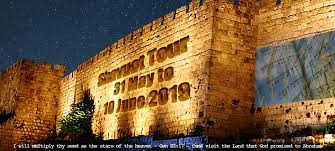Culture
Soul-searching on a Sunday: Shavuot 2019
The advent of Shavuot, which is a momentous celebration of the Jews receiving the Torah at
Shavuot, one of Judaism’s three pilgrimage festivals (along with Passover and Sukkot), will take place this year between sunset on Saturday, June 8, and nightfall on Sunday, June 9. The Government Press Office would like to offer the following as a brief summary.

Shavuot marks the giving of the Torah (Genesis, Exodus, Leviticus, Numbers and Deuteronomy; Judaism's most basic scripture) at

The celebration of Shavuot is specified in Exodus 34:22 and Deuteronomy 16:10. On Saturday night, June 8, after festive evening prayers and a festive meal, many people will follow the custom of staying awake all night and studying religious texts, and then saying morning prayers at the earliest permitted time – thus expressing the enthusiasm of the Jewish people to receive the Torah. Most synagogues and yeshivot will organize special classes and lectures throughout the night of Shavuot. In

The Shavuot morning prayers are marked by special hymns and scriptural readings, including the Book of Ruth. Special memorial prayers for the departed are also said. Some communities maintain the custom of decorating their synagogues with green plants and flowers; this is in keeping with traditions that

In ancient times, Shavuot marked the end of the barley harvest, and the beginning of the wheat harvest. Jewish farmers brought their first fruits to the

Accidents are natural; in fact, people have been having them since the beginning of creation, the documentation of which is poetically presented in the Torah’s various anecdotes documenting the human condition.
Likewise, the advent of Shavuot, which is a momentous celebration of the Jews receiving the Torah at
The Israelites had been traversing across the desert and were ready to receive the Torah from G-d in a crucial ceremony that would thereby fortify their status as the Jewish People. However, notwithstanding the day’s importance, they mistakenly overslept, according to the Midrash, and Moses had to awaken them after being reprimanded by G-d, who rhetorically asked, “why have I come and no one is here to receive me?” (Isaiah 50:2)
As a form of repentance and reconciliation, sages such as Rabbi Shimon Bar Yochai and Kabbalist Magen Avraham adopted the Zohar-originated practice of staying awake throughout the night studying on the eve of Shavuot, which grew to become a commonplace tradition. The widely accepted reasoning for this custom is that it shows how our enthusiasm for receiving the Torah does not wane overnight, nor does it tire us.

Think of having a huge event the next day—whether it be a sports competition, wedding celebration, or big trip—it is natural to have trouble falling asleep the night before out of excitement and anticipation. This is what we are trying to replicate by studying all night as we enter into the holiday of Shavuot.
However, this custom should not be perceived as a dogmatic decision without practical reason.
Stories for you more +